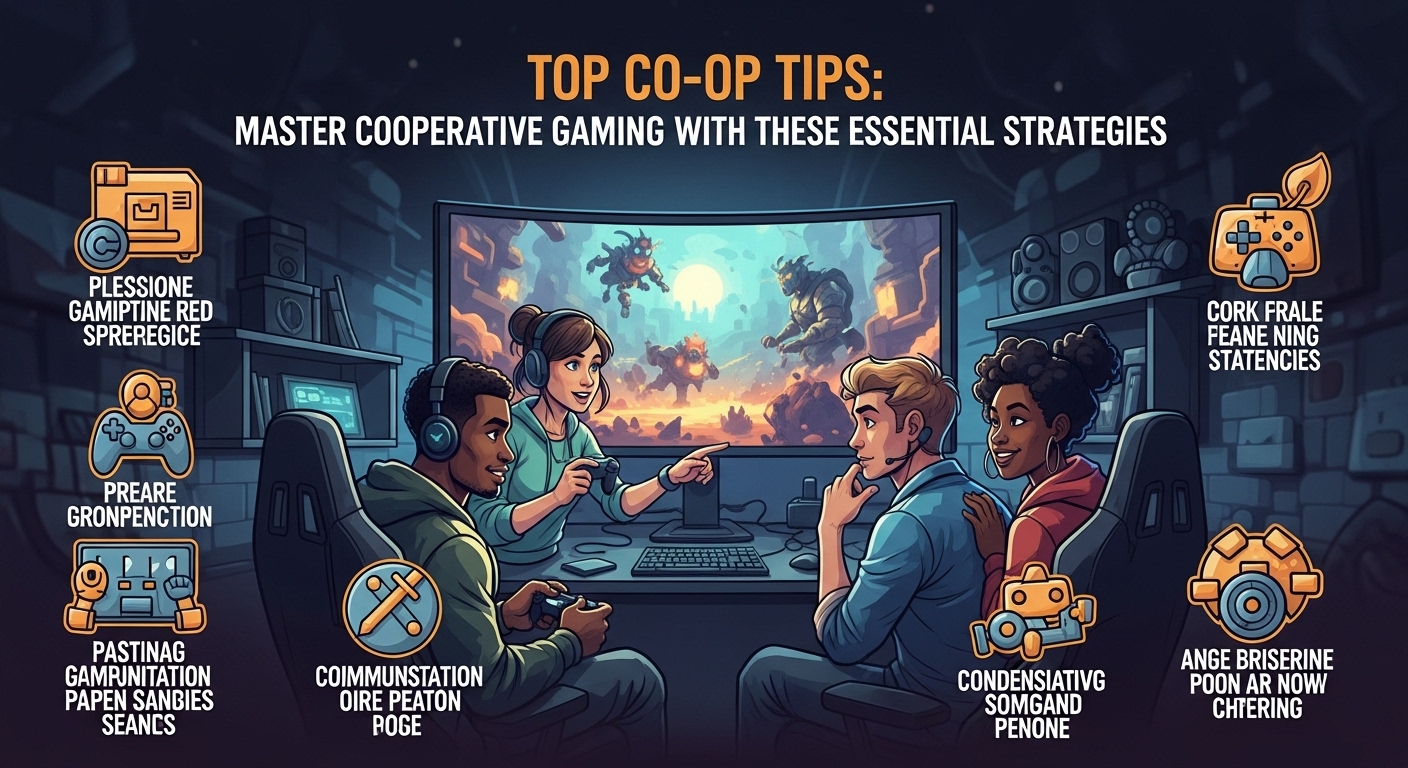Introduction to Cooperative Gaming Success
Cooperative gaming brings friends together for unforgettable adventures and shared victories. However, success requires more than individual skill alone. These top co-op tips will transform your multiplayer sessions into smooth, enjoyable experiences. Moreover, understanding teamwork fundamentals helps players achieve their common goals efficiently. Consequently, you’ll discover strategies that work across various game genres and platforms.
Building Strong Communication Foundations
Establish Clear Voice Channels Early
First and foremost, set up reliable voice communication before starting any gaming session. Quality audio connections prevent misunderstandings that often lead to failed missions or frustrating defeats. Additionally, test microphone volumes to ensure everyone hears each other clearly during intense moments. Furthermore, background noise reduction features help maintain focus when stakes run high.
Create Simple Callout Systems
Develop straightforward callout systems that teammates understand immediately without lengthy explanations. Short, descriptive phrases work better than complex terminology during fast-paced action sequences. Similarly, consistent location names prevent confusion when coordinating attacks or defensive positions. Therefore, practice these callouts during low-pressure situations before tackling difficult challenges.
Practice Active Listening Skills
Active listening transforms good teams into exceptional ones through mutual understanding and respect. Listen carefully when teammates share information about enemy positions or resource locations. Meanwhile, acknowledge their input with quick verbal confirmations to maintain team morale. Subsequently, everyone feels valued and stays engaged throughout longer gaming sessions.
Mastering Role Distribution and Specialization
Identify Individual Strengths Quickly
Each player brings unique skills and preferences that benefit the entire team dynamic. Assess everyone’s abilities early to assign roles that maximize overall effectiveness and enjoyment. Consequently, matches become more balanced when players perform tasks suited to their strengths. In addition, rotating roles occasionally keeps gameplay fresh and develops versatile team members.
Balance Offensive and Defensive Positions
Teams need both aggressive pushers and careful defenders to succeed in competitive environments. Too many attackers leave bases vulnerable while excessive defense limits scoring opportunities significantly. Therefore, discuss positioning strategies before matches to ensure proper coverage across all areas. Furthermore, adjust these positions based on opponent tactics and map requirements.
Coordinate Special Abilities Effectively
Special abilities create powerful combinations when teammates time their activation perfectly together. Plan ability sequences that complement each other rather than wasting resources on redundant effects. Additionally, communicate cooldown timers so teammates know when you can contribute again. Thus, strategic ability management often determines victory in closely contested matches.
Developing Tactical Awareness Together
Share Information Constantly
Information sharing keeps everyone aware of threats, opportunities, and changing battlefield conditions throughout matches. Call out enemy movements, item spawns, and objective updates as soon as you notice them. Meanwhile, avoid cluttering communication channels with irrelevant commentary during critical moments. As a result, teams make informed decisions that lead to strategic advantages over opponents.
Read Teammate Intentions Naturally
Experienced teams develop intuitive understanding of each other’s movements and decision-making patterns over time. Watch teammate positioning to predict their next actions and provide appropriate support automatically. Similarly, consistent playstyles help partners anticipate your moves without requiring constant verbal updates. Consequently, this synergy creates fluid teamwork that overwhelms less coordinated opponents.
Adapt Strategies Based on Performance
Flexibility separates winning teams from those stuck repeating ineffective approaches against skilled opponents. Monitor which tactics succeed and which fail, then adjust your strategy accordingly. Furthermore, discuss changes between rounds to ensure everyone understands the new approach completely. Otherwise, mixed signals cause coordination breakdowns that enemies exploit ruthlessly.
Managing Resources and Equipment Wisely
Pool Resources for Maximum Impact
Resource sharing strengthens overall team capability rather than hoarding supplies for individual benefit alone. Distribute ammunition, health items, and equipment based on current needs and role requirements. Additionally, high-impact items should go to players positioned for maximum strategic value. Therefore, selfless resource management often provides the edge needed in tight situations.
Plan Equipment Loadouts Together
Coordinate equipment selections to cover all necessary functions without redundant or conflicting choices. Ensure someone brings healing items while others focus on damage or utility options. Moreover, discuss loadout changes between matches to counter specific opponent strategies effectively. Subsequently, well-planned loadouts create versatile teams ready for any challenge.
Time Resource Collection Carefully
Collect resources when safe rather than during vulnerable moments that expose you unnecessarily. Coordinate collection runs so teammates provide covering fire while others gather important supplies. In addition, prioritize high-value resources that provide significant advantages over minor pickups. Thus, efficient collection maximizes benefits while minimizing risks to team survival.
Handling Pressure and Maintaining Morale
Stay Positive During Setbacks
Maintaining positive attitudes during difficult matches prevents team morale from collapsing completely under pressure. Encourage teammates after mistakes rather than criticizing errors that everyone occasionally makes during gameplay. Furthermore, remember that learning experiences often come from challenging defeats rather than easy victories. Consequently, constructive feedback helps everyone improve without damaging team chemistry permanently.
Celebrate Small Victories Together
Acknowledge successful plays and good decisions even during matches your team ultimately loses overall. Positive reinforcement builds confidence and keeps motivation high throughout extended gaming sessions together. Additionally, shared celebrations strengthen bonds that make cooperative gaming truly enjoyable beyond simple wins. Therefore, remember that friendship and fun matter more than perfect win rates.
Take Breaks When Needed
Recognize when frustration or fatigue affects performance negatively and suggest short breaks appropriately. Tired minds make poor decisions that compound into larger problems during competitive matches. Similarly, stepping away briefly helps reset mental state and restore focus for upcoming rounds. As a result, refreshed players perform significantly better than those pushing through exhaustion stubbornly.
Conclusion: Growing Together as Players
These strategies provide foundations for exceptional experiences across all types of team-based games. However, the most important element remains enjoying time spent with friends and fellow gamers. Practice these techniques consistently to see dramatic improvements in coordination and overall success rates. Moreover, remember that every team develops unique dynamics that make their playstyle special. Ultimately, cooperative gaming creates memories and friendships that last far beyond individual match results.

